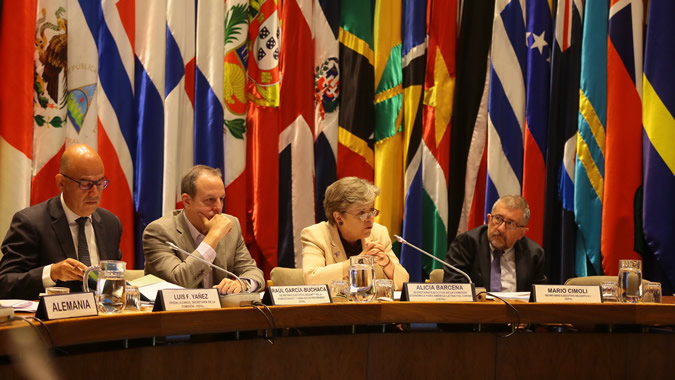Alicia Bárcena Presents Details about the Forum on sustainable development and ECLAC’s 37th Session to Member Countries
The Executive Secretary of the United Nations regional organization held an informational meeting today with representatives of the diplomatic corps from the Commission’s member countries.

The Executive Secretary of the Economic Commission for Latin America and the Caribbean (ECLAC), Alicia Bárcena, and diplomatic representatives of the United Nations regional organization’s member countries held an informational meeting today about important regional gatherings that will take place next April and May in Santiago, Chile and Havana, Cuba, respectively.
The meeting, held at ECLAC’s headquarters in Chile, was attended by representatives of the diplomatic corps from numerous countries in the region, as well as from the Commission’s members outside the region.
During the gathering, Alicia Bárcena provided details on the second meeting of the Forum of the Countries of Latin America and the Caribbean on Sustainable Development, which will be held on April 18-20 and where representatives of governments, international institutions, the private sector, academia and civil society will come together to review the progress and challenges of implementing the 2030 Agenda for Sustainable Development in the region.
The meeting, organized by ECLAC and the government of Mexico, will take place at the United Nations regional organization’s central headquarters located in Santiago, Chile.
The Forum was created via the approval of the Mexico Resolution at the thirty-sixth session of ECLAC, held in May 2016 in Mexico City, and was conceived of as a regional mechanism for implementation and follow-up of the 2030 Agenda and its 17 Sustainable Development Goals.
During the meeting of the Forum in Santiago, ECLAC will present the second annual report on regional progress and challenges related to the 2030 Agenda for Sustainable Development. An interregional dialogue between Latin America and the Caribbean and Europe on implementation of the 2030 Agenda will also take place.
In the framework of the meeting, work groups will be carried out for peer learning on the challenges and participation-related focuses of the 2030 Agenda’s implementation, as well as on the platforms for follow-up to the SDGs.
The Forum will include sessions about the transformation toward sustainable and resilient societies and the environmental challenges of implementation of the 2030 Agenda. A special session on artificial intelligence and accelerated technological change will also be held.
At the first meeting of the Forum, which took place on April 26-28, 2017 in Mexico City, the region’s countries reaffirmed their collective commitment to the 2030 Agenda for Sustainable Development, recognizing that governments hold primary responsibility for its achievement and acknowledging the need to foster the participation of all stakeholders in the process.
The diplomatic representatives were also informed about the details of the Thirty-seventh session of ECLAC, the regional organization’s most important biennial meeting, which will be held on May 7-11 in Havana, Cuba.
The designation of Cuba was enthusiastically endorsed by ECLAC’s member countries at the conclusion of the work carried out during the Thirty-sixth session, held from May 23 to May 27, 2016 in Mexico City.
The session offers a forum for analyzing the issues of greatest relevance to the economic and social development of the region’s countries and for examining the progress made on the Commission’s activities.
At the meeting, ECLAC will present to its 46 member countries its activities report and will share with governments a reflection on development strategy advances in the context of the 2030 Agenda’s commitments and the Sustainable Development Goals.
Related event
Type
Country(ies)
- Latin America and the Caribbean